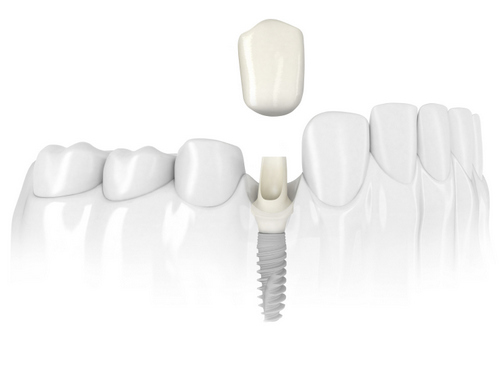Dental Implant FAQ
 What are Dental Implants?
The implants themselves are tiny titanium or ceramic screws, which are inserted into the jawbone where teeth are missing. These anchors act as tooth root substitutes. They are surgically placed into the jawbone. The bone bonds with the implant, creating a strong foundation for artificial teeth. Small posts, which protrude through the gums, are then attached to the implant. These posts provide stable anchors for artificial replacement teeth.
Implants also help preserve facial structure, preventing bone deterioration that occurs when teeth are missing.
Why dental implants?
Once you learn about dental implants, you finally realize there is a way to improve your life. When you lose several teeth whether it's a new situation or something you have lived with for years, chances are you have never become fully accustomed to losing such a vital part of yourself. Loss of teeth may ultimately lead to severe bone loss and distortion of facial appearance. Many patients who have been wearing dentures for decades have been told that they do not have enough bone for implants. With modern treatment and techniques, this is no longer true.
What other types of prostheses are available?
A single prosthesis (crown) is used to replace one missing tooth: each prosthetic tooth attaches to its own implant. A partial prosthesis (fixed bridge) can replace two or more teeth and may require only two or three implants. A complete dental prosthesis (fixed bridge) replaces all the teeth in your upper or lower jaw. The number of implants varies depending upon which type of complete prosthesis (removable or fixed) is recommended. A removable prosthesis (over denture) attaches to a bar or ball in socket attachments, whereas a fixed prosthesis is permanent and removable only by the dentist.
Are you a candidate for dental implants?
If you are considering implants, your mouth must be examined thoroughly and your medical and dental history reviewed. If your mouth is not ideal for implants, ways of improving outcome, such as bone grafting, may be recommended.
What type of anesthesia is used?
Most cases of dental implants and bone grafting can be performed in the office under local anesthesia, with or without sedation.
Do implants need special care?
Once the implants are in place, they will serve you well for many years if you take care of them and keep your mouth healthy. This means taking the time for good oral hygiene (brushing and flossing) and keeping regular appointments with your dentist.
For more information on how dental implants can be a benefit to you, please contact McNickle Family Dentistry at (555) 555-5555. |